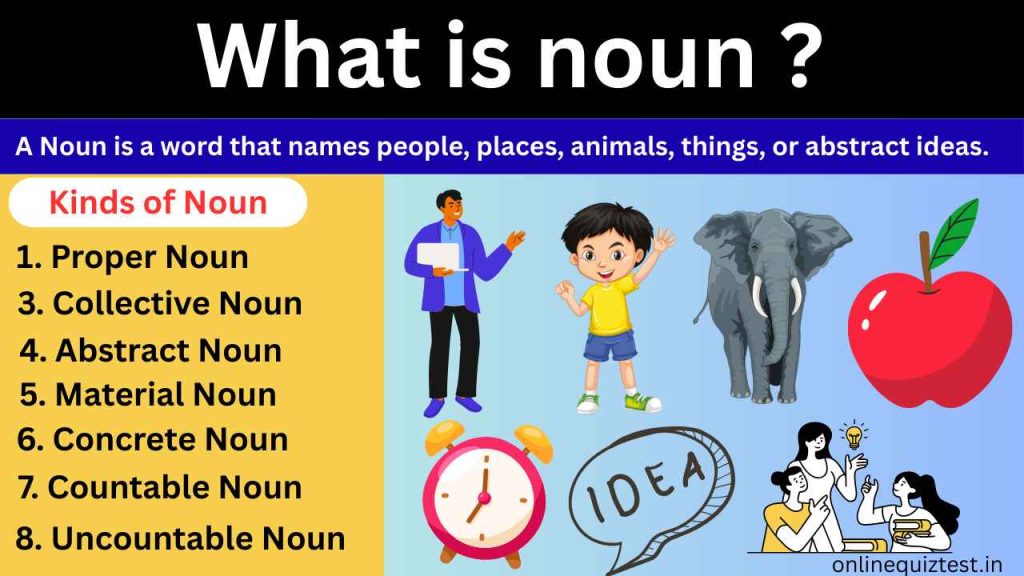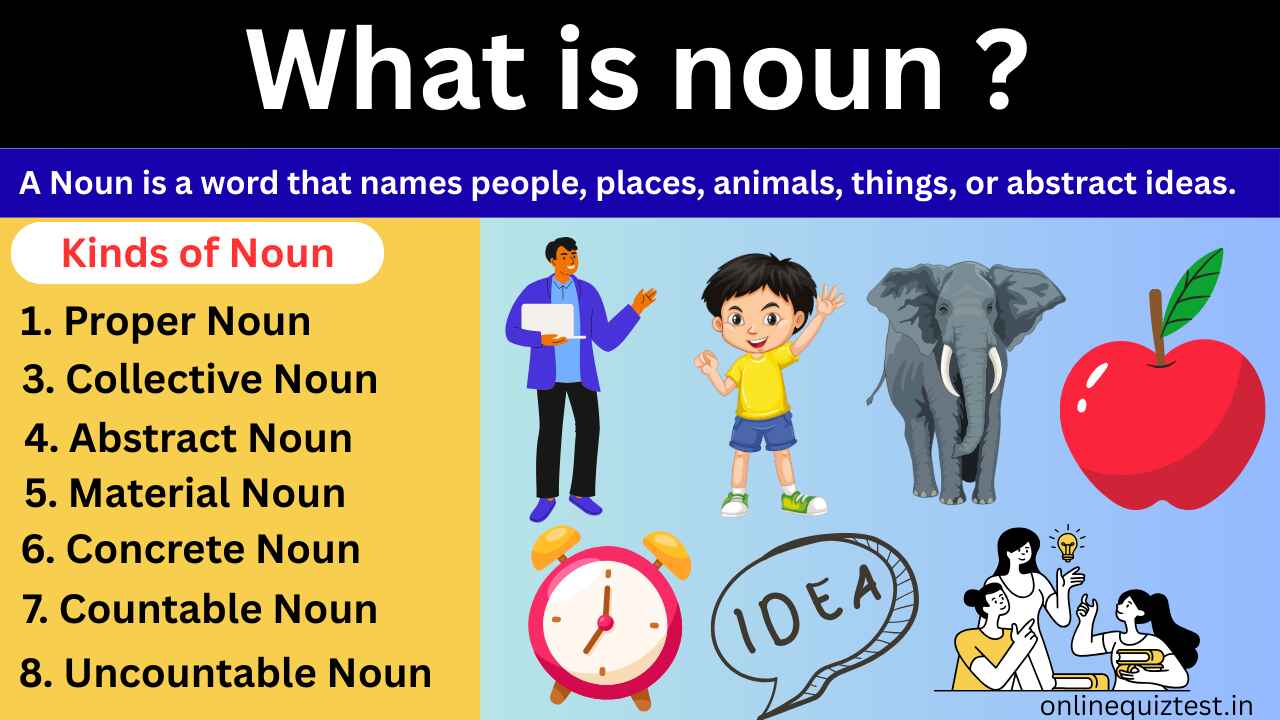All the naming words are nouns. Noun is a word used as of a person, animal, place, thing.
Simple Definition: What is a noun
A noun is the name of any person, a word that names people, places, animals, things, or abstract ideas.

Examples of Nouns:
- Person: teacher, doctor, Mary, John
- Place: school, park, London, India
- Animal: dog, cat, elephant, tiger
- Thing: chair, book, mobile, car
- Idea/Quality: love, honesty, freedom, knowledge
Without nouns, a sentence would not make sense. For example:
- With nouns: The dog chased the cat.
- Without nouns: The ____ chased the ____.
Clearly, nouns are essential for meaningful sentences.
Importance of Nouns in English Grammar
Nouns are important because:
- They identify and differentiate people, objects, and ideas.
- They help us communicate clearly.
- They give structure and meaning to our speech and writing.
For example:
- Ravi (noun) is reading a book (noun).
Here, both the subject and object are nouns.
Kinds of Noun
Nouns are divided into several categories.
Proper Noun
A proper noun is a name of a particular Person, place, animal, thing.
Examples:
- People: Albert Einstein, Mahatma Gandhi, Amitabh Bachchan.
- Places: Paris, London, Taj Mahal
- Days/Months: Monday, December
Sentence Examples:
- Mohan is going to Delhi.
- New Delhi is the capital of India.
- The Mahabharat is a great epic.
2. Common Noun
Common nouns are names common to people, places, animals, and things of the same class or kind.
Examples:
- boy, girl, city, mountain, teacher, river
Sentence Examples:
- The teacher is explaining the lesson.
- A river flows through the village.
3. Collective Noun
A collective noun refers to a group of people, animals, or things considered as one unit.
Examples:
- crowd, team, class, herd, family, army
Sentence Examples:
- A team of players won the match.
- The flock of birds flew away.
4. Abstract Noun
Abstract means something which cannot be seen or touched but can only be felt or experienced.
Examples:
- happiness, love, honesty, bravery, freedom, knowledge
Sentence Examples:
- Honesty is the best policy.
- Love brings peace and harmony.
5. Material Noun
Material noun is the name of a material or a substance out of which things are made.
Examples:
- gold, silver, cotton, wood, water, iron
Sentence Examples:
- This necklace is made of gold.
- The table is made of wood.
6. Concrete Noun
A concrete noun refers to things that can be seen, touched, smelled, or heard. These are physical objects.
Examples:
- chair, apple, book, pen, music, flower
Sentence Examples:
- The apple is on the table.
- She bought a pen yesterday.
7. Countable Noun
Countable nouns refers to all those things that we can count.
Examples:
- apple/apples, book/books, car/cars
Sentence Examples:
- I have two books.
- There are five cars in the parking lot.
8. Uncountable Noun
Uncountable nouns are those nouns which can not be counted.
Examples:
- water, sugar, rice, information, milk, advice
Sentence Examples:
- She needs some water.
- Too much sugar is harmful.
9. Compound Noun
A compound noun is formed when two or more words are combined to create a new meaning.
Examples:
- toothpaste, bedroom, policeman, football, mother-in-law
Sentence Examples:
- My toothpaste tastes minty.
- The policeman is helping the children.
Noun in Sentences – Practical Examples
Here are some practical examples of nouns used in sentences:
- Rahul (proper noun) plays the guitar (common noun).
- The army (collective noun) is marching.
- Love (abstract noun) is powerful.
- This ring is made of silver (material noun).
- The book (countable noun) is on the table.
- Please give me some milk (uncountable noun).
- I bought a football (compound noun) yesterday.
Rules for Using Nouns
- Always begin a proper noun with a capital letter.
- Use singular and plural forms correctly.
- Boy → Boys
- Child → Children
- Use countable nouns with numbers (e.g., three apples).
- Use uncountable nouns with quantities (e.g., a glass of water).
- Some nouns are the same in singular and plural form (e.g., sheep, deer).
Difference Between Common and Proper Noun
| Common Noun | Proper Noun |
| Names general things | Names specific things |
| Example: city | Example: Delhi |
| Does not begin with a capital letter | Always begins with a capital letter |
Conclusion :
To sum up, a noun is the foundation of language. It names people, places, animals, things, materials, and even abstract ideas. By understanding the kinds of nouns—such as proper, common, collective, abstract, material, concrete, countable, uncountable, and compound—you can improve your English grammar and communication skills.
Whenever you speak or write, you are using nouns without even realizing it. Mastering nouns is the first step toward mastering the English language
Frequently Asked Questions (FAQ)
What is a noun in simple words?
A noun is a naming word. It gives a name to people, places, animals, things, and ideas.
What are 5 examples of nouns?
Examples: dog, teacher, India, love, chair.
What are the 9 types of nouns?
Proper noun, common noun, collective noun, abstract noun, material noun, concrete noun, countable noun, uncountable noun, and compound noun.
What is the difference between a noun and a pronoun?
A noun names something (e.g., Ravi, book, city). A pronoun replaces a noun (e.g., he, she, it, they).
